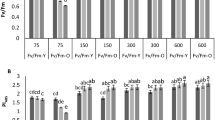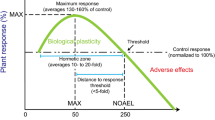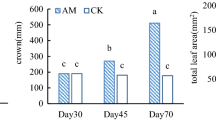Abstract
Sweet and Wareing1 have recently discussed the role of plant growth in controlling the rate of photosynthesis by increasing the translocation of assimilates from the leaves. We have worked with Chrysanthemum morifolium grown as a flowering pot plant2 in conditions in which the flowers became an important sink for assimilates. We have examined the effect of removing these sinks on the accumulation of dry matter and our results seem to illustrate a system in which the rate of accumulation of dry matter is not affected by the removal of an important sink.
This is a preview of subscription content, access via your institution
Access options
Subscribe to this journal
Receive 51 print issues and online access
$199.00 per year
only $3.90 per issue
Buy this article
- Purchase on Springer Link
- Instant access to full article PDF
Prices may be subject to local taxes which are calculated during checkout
Similar content being viewed by others
References
Sweet, G. B., and Wareing, P. F., Nature, 210, 77 (1966).
Cockshull, K. E., and Hughes, A. P., Nature, 215, 780 (1967).
Edelman, J., in The Growth of the Potato, 135 (Butterworths, London, 1963).
Author information
Authors and Affiliations
Rights and permissions
About this article
Cite this article
COCKSHULL, K., HUGHES, A. Accumulation of Dry Matter by Chrysanthemum morifolium after Flower Removal. Nature 217, 979–980 (1968). https://doi.org/10.1038/217979a0
Received:
Revised:
Issue Date:
DOI: https://doi.org/10.1038/217979a0
This article is cited by
Comments
By submitting a comment you agree to abide by our Terms and Community Guidelines. If you find something abusive or that does not comply with our terms or guidelines please flag it as inappropriate.



